A Quetico Solo, August 2008
by UncleMoose
Day 4 - Fauquier Lake to Glacier Lake (Wednesday, August 6) [full index]
6.1 miles, 7 portages
I awoke before sunrise to clear skies. Anxious to get an early start, I quickly ate breakfast and tore down camp.
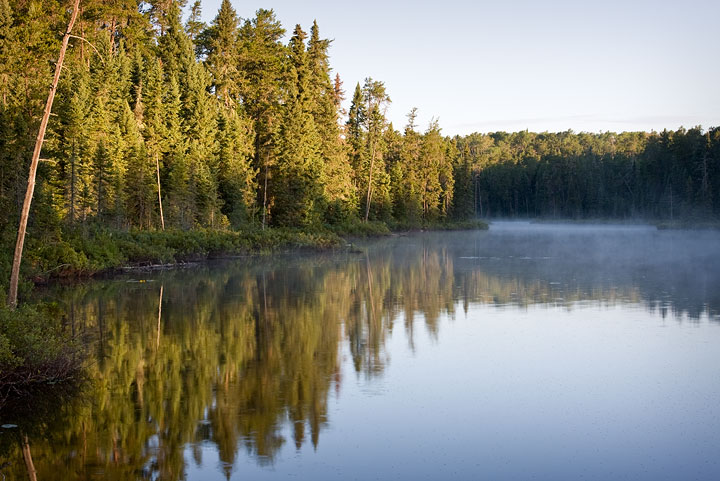
Just as I was getting ready to leave, dark clouds appeared from seemingly nowhere and rapidly rolled in. I scrambled to get a tarp set up, and soon it was raining. Hoping the rain would pass quickly, I took a seat and began looking over maps.
A couple of hours later the rain finally moved out, and I was again preparing to shove off. If my route had consisted mostly of paddling today, it probably would have made more sense to just head out in the rain and get wet. But as it was, the first part of today's route included a tricky portage notorious for being treacherous when wet. With well over two weeks still to go on this trip I was in no hurry.

The next portage was indeed as difficult as I had read. Portions of the rocky trail were very narrow, and some stretches closely hugged the adjacent creek bed. Sometimes the path would run precariously high above the creek, and in other places the path and creek essentially merged and become one. It was a beautiful portage that unfortunately also required you to keep your eyes firmly fixed on the path. At one point I got a little casual with my footing while recording some video, and I quickly found myself on my back in the creek. So much for staying dry.
Next, after paddling through Dumas Lake I crossed a short portage into McEwen Creek. McEwen Creek turned out to be a real highlight of the trip for me. The wide, shallow and still waters reflected like glass, and when the sun would peek out from behind the clouds and hit the wavy grasses just below the surface, it would cause the grass to glow almost like neon. This stretch of water was a true paddler's dream, and I savored every moment.

McEwen Creek led me to Rod Lake, and after a short, but steep portage up and down, I continued my paddling northeast across Edge Lake. As I neared the far end of Edge, some ominous clouds I had been watching to the northwest finally began to produce distant rumbles of thunder. A major concern to me at this point was finding a campsite before the approaching storms pinned me down, but according to my maps there were no established campsites anywhere nearby. The next marked site appeared to be a few lakes away on Glacier Lake.
Keeping a very close eye on the darkening clouds, I managed to gain some time by walking the canoe through the shallow, rocky stream at the next portage. The storm clouds seemed to be holding off a bit to the northwest as I quickened the pace across the next unnamed lake and plowed through the next short portage into Turn Lake. By the time I shoved off onto Turn, however, it had become clear that I was not going to make it all the way to Glacier Lake before the storm hit. The best I was going to do was make it to the next portage where I could hopefully hunker down.
The wind was really picking up when I made the turn toward the portage landing. Suddenly, I was startled by the flapping of a huge pair of wings belonging to a Great Blue Heron that I must have surprised when I appeared from around the bend. The enormous bird had launched itself from a nearby tree and was now flying directly over the canoe. My already excited nerves received an extra jolt from the experience which further helped to motivate me off the water.
I pulled into the nicely sheltered portage and quickly began setting up a tarp to one side of the trail. I tried to find a reasonably level spot in the event I was pinned down past dark and needed to setup the tent. I wasn't too happy about the prospect of setting up camp next to a portage, but my options were rather limited at the moment. The thunder was growing louder and flashes of lightning were now visible.
Not long after securing the last tarp line, the storm finally passed overhead, lighting up the sky and dropping its payload of rain. Fortunately, it was not a particularly large or strong storm, just one of those typical summer afternoon cloudbursts. Almost as quickly as it had arrived the storm was past me and moving into the distance. The sun reemerged soon after, causing all the drops of rain still dripping from the drenched landscape to sparkle.

With only a few hours left before sunset, I hurriedly packed up and headed over the portage. At the other side was a beautiful marsh brilliantly lit up by the late afternoon sun. A small creek ran through the marsh and led to the final portage before Glacier Lake. The creek was short, but choked with grasses. At first it wasn't even clear how I was going to get through, but as I paddled, the grasses kept parting, and soon I was through to the other side. It took a little while longer to spot the actual portage, and then some creative maneuvering was required to weave the canoe past a group of boulders guarding the landing. But eventually, I made it past the boulders, through the mud and onto solid ground. The final portage of the day was no treat either, but before long I was on Glacier Lake looking for a campsite.
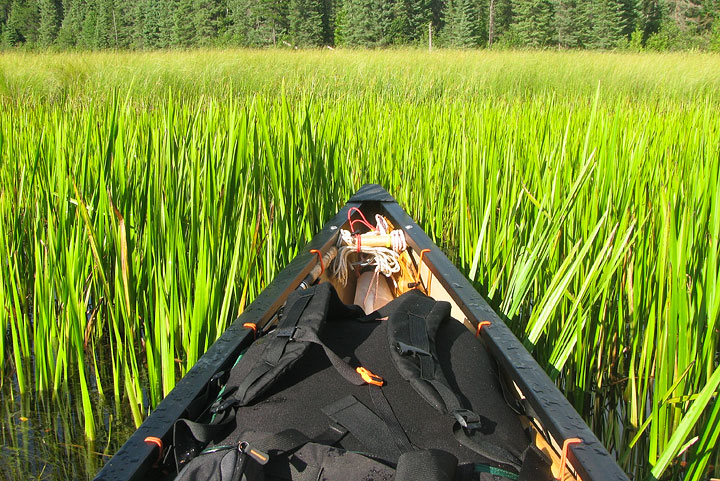
I first checked-out the established northernmost campsite which had previously been recommended to me. The landing to the site was a difficult one, and the camp area itself sat up high on a ridge. Concerned with its open exposure to the elements, I decided to investigate a few other potential locations a little further down the lake. But after being unable to locate anything else nearby, I returned to the first site up on the ridge.
As I was setting up camp, dark, ominous clouds reappeared to the northwest, and rumbles of thunder soon followed. I worked quickly to erect the tent in a sheltered tent pad space directly behind the main sitting area. These pads sat much lower than the rest of the campsite, which caused me some concern about flooding. But my options were limited, as any other spot would have left me badly exposed to the oncoming storm. Adding to my worries was the elevated nature of the site and the fact that the storm was heading straight in off the lake, directly at me.
As soon as the tent was secured, I immediately went to work getting a tarp set up over the sitting area. I didn't have much time because, unlike the storm earlier in the afternoon, this one was really approaching fast. I was still securing tarp lines when I looked out and saw the storm's leading edge rolling rapidly across the surface of the lake. I grabbed the front edge of the tarp and held on tight as a wall of wind and rain hit head-on. Within seconds everything was soaked, including me. Clearly, a tarp is not very effective when the rain comes in sideways.
After a few minutes of being power-washed, the wall passed through, the wind subsided, and the rain took on a more normal vertical trajectory. The campsite, which had just moments before been nice and dry, now had a small river running through it. To exacerbate the situation, I noticed that one fork of the river was cascading down into the low area where the tent was erected. I went down to investigate and was discouraged when I found the tent sitting in a few inches of water. I took a nervous look inside but was relieved to discover that the tent's waterproof base was working, and everything was dry.
Just like earlier in the afternoon, the storm moved through quickly. Soon the clouds were breaking up and helping to paint a colorful sunset.
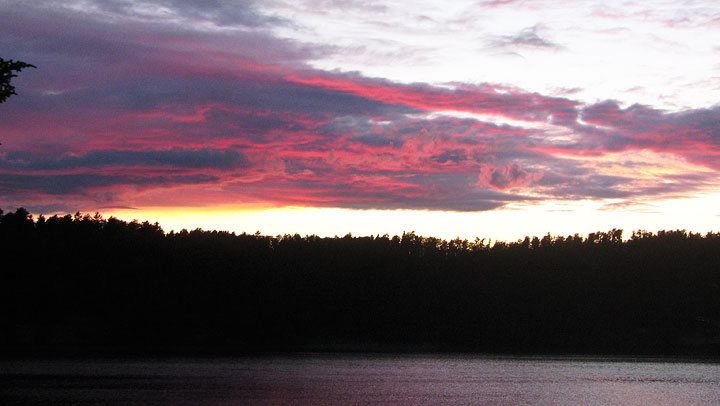
I ate a late meal while under attack by hundreds of highly energized and determined mosquitos. The weather had been a challenge today, but I was happy with my progress and grateful to have experienced this beautiful part of Quetico.
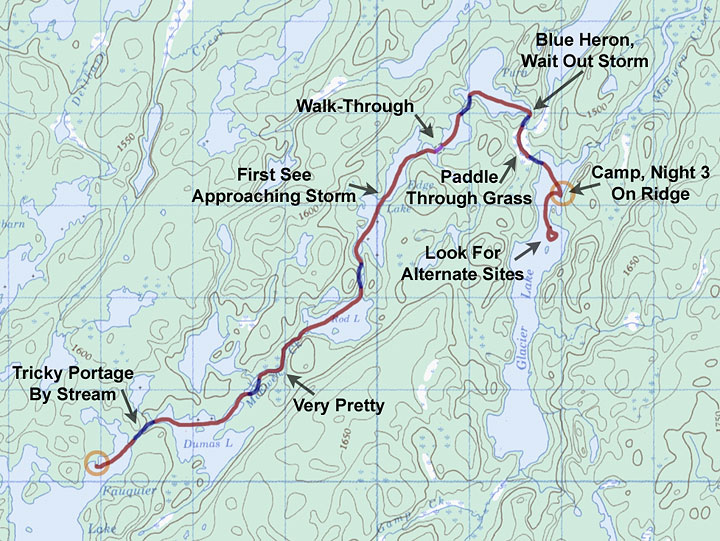
Videos (click on an image below to play)
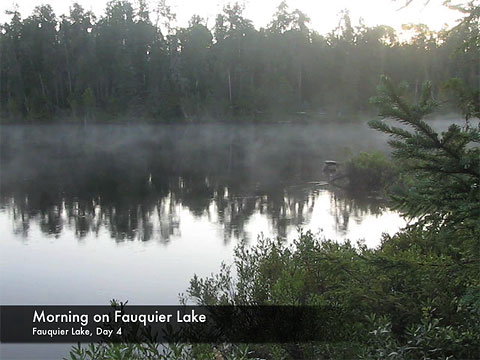
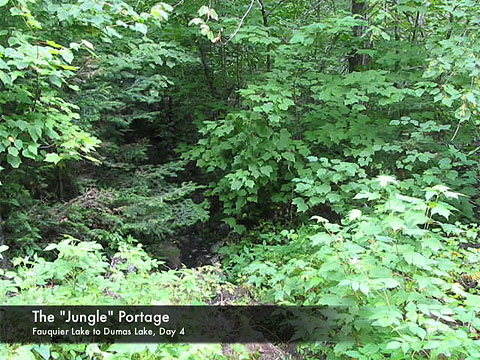
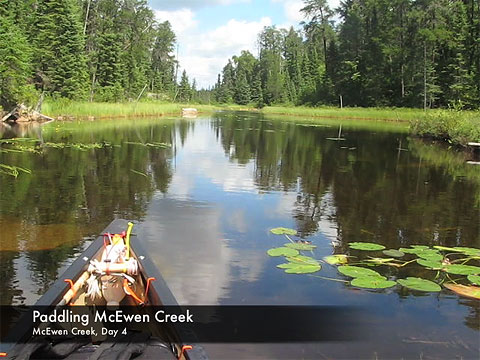
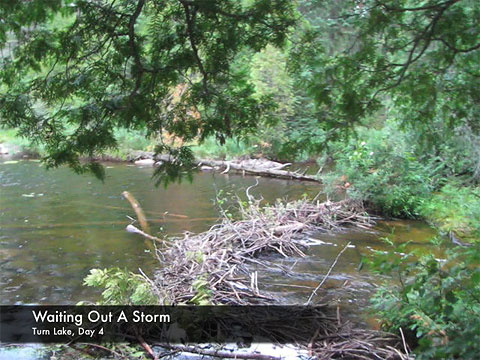
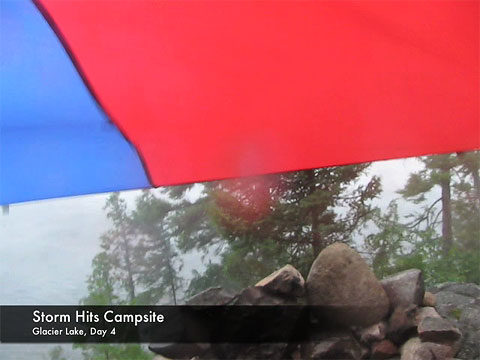
Click here for the fully formatted report

 Donate - BWCA.com
Donate - BWCA.com